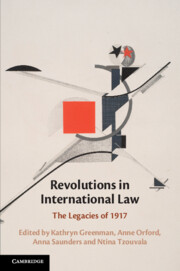Book contents
- Revolutions in International Law
- Revolutions in International Law
- Copyright page
- Contents
- Notes on Contributors
- Acknowledgements
- 1 International Law and Revolution
- Part I Imperialism
- Part II Institutions and Orders
- Part III Intervention
- Part IV Investment
- Part V Rights
- 15 ‘Animated by the European Spirit’
- 16 Human Rights, Revolution and the ‘Good Society’
- Index
16 - Human Rights, Revolution and the ‘Good Society’
The Soviet Union and the Universal Declaration of Human Rights
from Part V - Rights
Published online by Cambridge University Press: 21 January 2021
- Revolutions in International Law
- Revolutions in International Law
- Copyright page
- Contents
- Notes on Contributors
- Acknowledgements
- 1 International Law and Revolution
- Part I Imperialism
- Part II Institutions and Orders
- Part III Intervention
- Part IV Investment
- Part V Rights
- 15 ‘Animated by the European Spirit’
- 16 Human Rights, Revolution and the ‘Good Society’
- Index
Summary
It has often been suggested that the human rights politics of the late 1970s intended ‘not to open the gates of paradise, but to bolt the gates of hell’.1 This conception of human rights as protections against ‘the worst’ was bound up with a reassessment of revolutionary politics as, at best, hubristic folly, and, at worst, totalitarian. As Soviet dissidents embraced the language of human rights to campaign against the Soviet state, a new NGO-led human rights politics came to express a realist rejection of revolutionary utopias.2 This human rights politics renounced the revolutionary aspirations of the communist left, while marginalising even the social-democratic ideals that had informed the Universal Declaration of Human Rights’ social and economic rights. Epitomising this divorce of human rights from more expansive visions of social and economic justice, Michael Ignatieff suggested in 2001 that the ‘elemental priority of all human rights activism’ should be to mitigate suffering by preventing torture, beatings, killings, rape and assault. Ignatieff argued for prioritising the civil and political rights of a ‘capitalist rights tradition’ against what he framed as a ‘Communist rights tradition – which put primacy on economic and social rights’.
Keywords
- Type
- Chapter
- Information
- Revolutions in International LawThe Legacies of 1917, pp. 401 - 427Publisher: Cambridge University PressPrint publication year: 2021



